
-
 The following statement was released by the Socialist Alliance in Australia. Visit www.socialist-alliance.org for more information. * * * Socialist Alliance salutes the millions of French workers and students who have taken to the streets in a wave of sustained demonstrations and strikes against the Sarkozy governments’ attack on pensions.
The following statement was released by the Socialist Alliance in Australia. Visit www.socialist-alliance.org for more information. * * * Socialist Alliance salutes the millions of French workers and students who have taken to the streets in a wave of sustained demonstrations and strikes against the Sarkozy governments’ attack on pensions. -
 The political situation in France is dominated by the struggle against the proposed reform of the pension system to raise the age of retirement, among other things. This reform is at the heart of French President Nicolas Sarkozy’s austerity policy. Although presented as a demographic necessity, it is increasingly opposed by the public. The struggle has been growing since the start of the mobilisations in May and the first day of action in June. Since the beginning of September, three days of strikes and demonstrations have brought out about 3 million people on each occasion.
The political situation in France is dominated by the struggle against the proposed reform of the pension system to raise the age of retirement, among other things. This reform is at the heart of French President Nicolas Sarkozy’s austerity policy. Although presented as a demographic necessity, it is increasingly opposed by the public. The struggle has been growing since the start of the mobilisations in May and the first day of action in June. Since the beginning of September, three days of strikes and demonstrations have brought out about 3 million people on each occasion. -
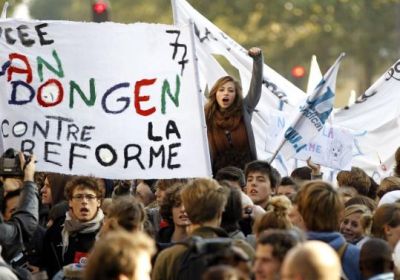 Workers and students mobilised in their millions on October 12 in the fourth and largest day of action in the past month against laws that will reduce workers’ pension entitlements. The protests and strikes came as the Senate passed aspects of the pension bill that will see an increase in the retirement age from 60 to 62 years of age and increase the period of time workers must work to receive a full pension. The protests show growing polarisation over who should pay the price for the economic crisis in the lead up to national strikes on October 16 and 19.
Workers and students mobilised in their millions on October 12 in the fourth and largest day of action in the past month against laws that will reduce workers’ pension entitlements. The protests and strikes came as the Senate passed aspects of the pension bill that will see an increase in the retirement age from 60 to 62 years of age and increase the period of time workers must work to receive a full pension. The protests show growing polarisation over who should pay the price for the economic crisis in the lead up to national strikes on October 16 and 19. -
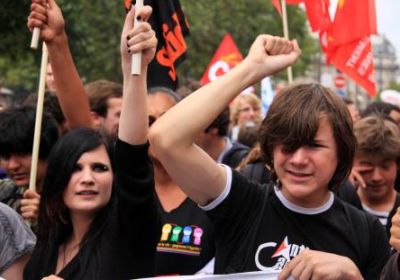
The political situation in France is dominated by the mobilization against the proposed reform of the pension system. This reform is at the heart of Sarkozy’s austerity policy. Although it is presented as an obvious demographic necessity, it is meeting increasing opposition in public opinion.
-
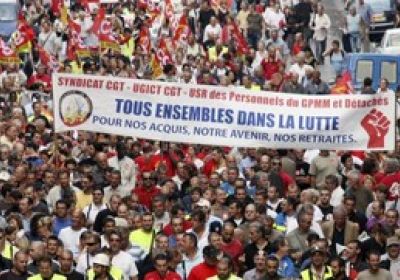
Workers and students mobilised in their millions on October 12 in the fourth and largest mobilisation in the last month against laws that will reduce the pension entitlements of French workers.
-
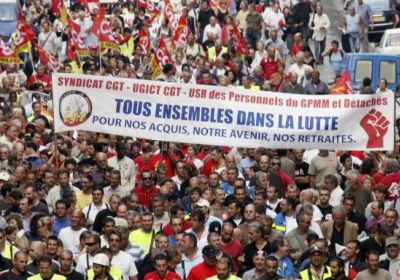
More than three million people took part in strikes and protests across France on September 23. They were demanding the withdrawal of laws that will dramatically reduce the right of workers to access pensions. The protests, which had been called by a coalition of seven of France’s union confederations, showed that the passage of the Pension Bill through France’s lower house of parliament had done nothing to weaken opposition to the attack on pensions.
-
 On September 14, the French Senate passed legislation that will make the wearing of either a burqa or niqab — Islamic dress worn by some Muslim women that covers the face — illegal in public. The ban was motivated by President Nicolas Sarkozy as an important step in winning equality for women. Opponents of the ban labeled it racist, but, importantly, it is also fundamentally sexist.
On September 14, the French Senate passed legislation that will make the wearing of either a burqa or niqab — Islamic dress worn by some Muslim women that covers the face — illegal in public. The ban was motivated by President Nicolas Sarkozy as an important step in winning equality for women. Opponents of the ban labeled it racist, but, importantly, it is also fundamentally sexist. -
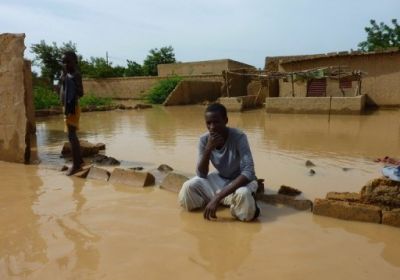 For five centuries, Africa has suffered at the hands of the West. Starting with the slave trade, through the colonial era, to today’s neoliberal global economy, the development of industrial capitalism in the West has come at a terrible price paid by Africans. Food riots in Mozambique early this month and looming mass starvation in Niger after floods that were preceded by years of drought both reflect the ongoing economic exploitation. However, they also reflect another creation of the industrialised West adversely affecting Africa: climate change.
For five centuries, Africa has suffered at the hands of the West. Starting with the slave trade, through the colonial era, to today’s neoliberal global economy, the development of industrial capitalism in the West has come at a terrible price paid by Africans. Food riots in Mozambique early this month and looming mass starvation in Niger after floods that were preceded by years of drought both reflect the ongoing economic exploitation. However, they also reflect another creation of the industrialised West adversely affecting Africa: climate change. -
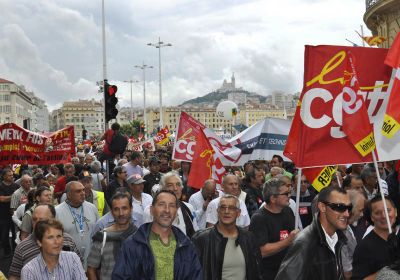 More than 2.7 million workers joined protests across France on September 7. The strikes and protests marked the start of a parliamentary debate over the new pension bill that will dramatically cut workers’ pensions. The protests were called by coalition of six of France’s Union Confederations.
More than 2.7 million workers joined protests across France on September 7. The strikes and protests marked the start of a parliamentary debate over the new pension bill that will dramatically cut workers’ pensions. The protests were called by coalition of six of France’s Union Confederations. -
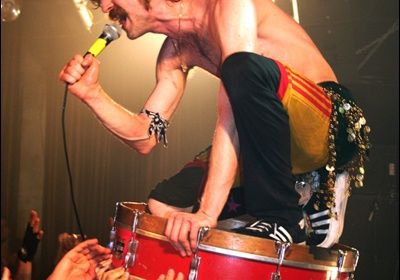 Trans-Continental Hustle Gogol Bordello Colombia/ DMZ Review by Mat Ward Gogol Bordello have always said their aim is to smuggle Roma music into mainstream Western society. Their latest album, produced by former Beastie Boys DJ-turned-super-producer Rick Rubin, might just do that. The US-based band, whose music combines elements of traditional Romani music with punk rock, is largely made up of Eastern European Roma immigrants who understand the long-standing persecution of their people.
Trans-Continental Hustle Gogol Bordello Colombia/ DMZ Review by Mat Ward Gogol Bordello have always said their aim is to smuggle Roma music into mainstream Western society. Their latest album, produced by former Beastie Boys DJ-turned-super-producer Rick Rubin, might just do that. The US-based band, whose music combines elements of traditional Romani music with punk rock, is largely made up of Eastern European Roma immigrants who understand the long-standing persecution of their people. -
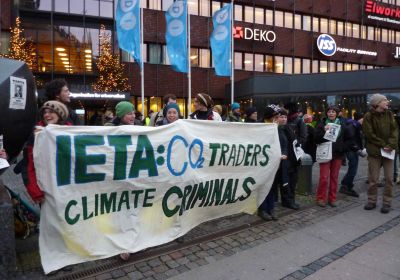 The global carbon market, which trades “pollution rights” to encourage industry to cut greenhouse gas emissions, grew in 2009. Far from signaling a success, this reflects a huge increase in fraud, the dumping of surplus emissions permits by industry, and a rise in financial speculation.
The global carbon market, which trades “pollution rights” to encourage industry to cut greenhouse gas emissions, grew in 2009. Far from signaling a success, this reflects a huge increase in fraud, the dumping of surplus emissions permits by industry, and a rise in financial speculation. -
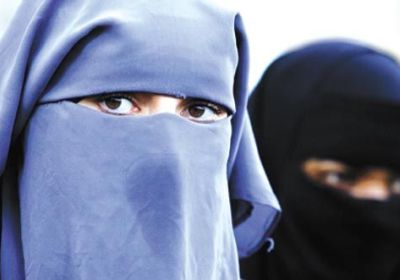 The French Parliament, on the eve of Bastille Day, voted 335 to one in favour of preventing Muslim women wearing a full face-covering veil in public. The July 13 Le Monde said the new law was strongly supported by the right. The gutless Socialist Party (PS), French Communist Party (PCF) and Green Party, while being “resolutely opposed” to the wearing of the niqab and the burka, abstained. The PS’s big objection was that the legislation is a “gift for fundamentalists”. Maybe. Mostly it’s a gift for every racist Islamophobe in Europe.
The French Parliament, on the eve of Bastille Day, voted 335 to one in favour of preventing Muslim women wearing a full face-covering veil in public. The July 13 Le Monde said the new law was strongly supported by the right. The gutless Socialist Party (PS), French Communist Party (PCF) and Green Party, while being “resolutely opposed” to the wearing of the niqab and the burka, abstained. The PS’s big objection was that the legislation is a “gift for fundamentalists”. Maybe. Mostly it’s a gift for every racist Islamophobe in Europe.